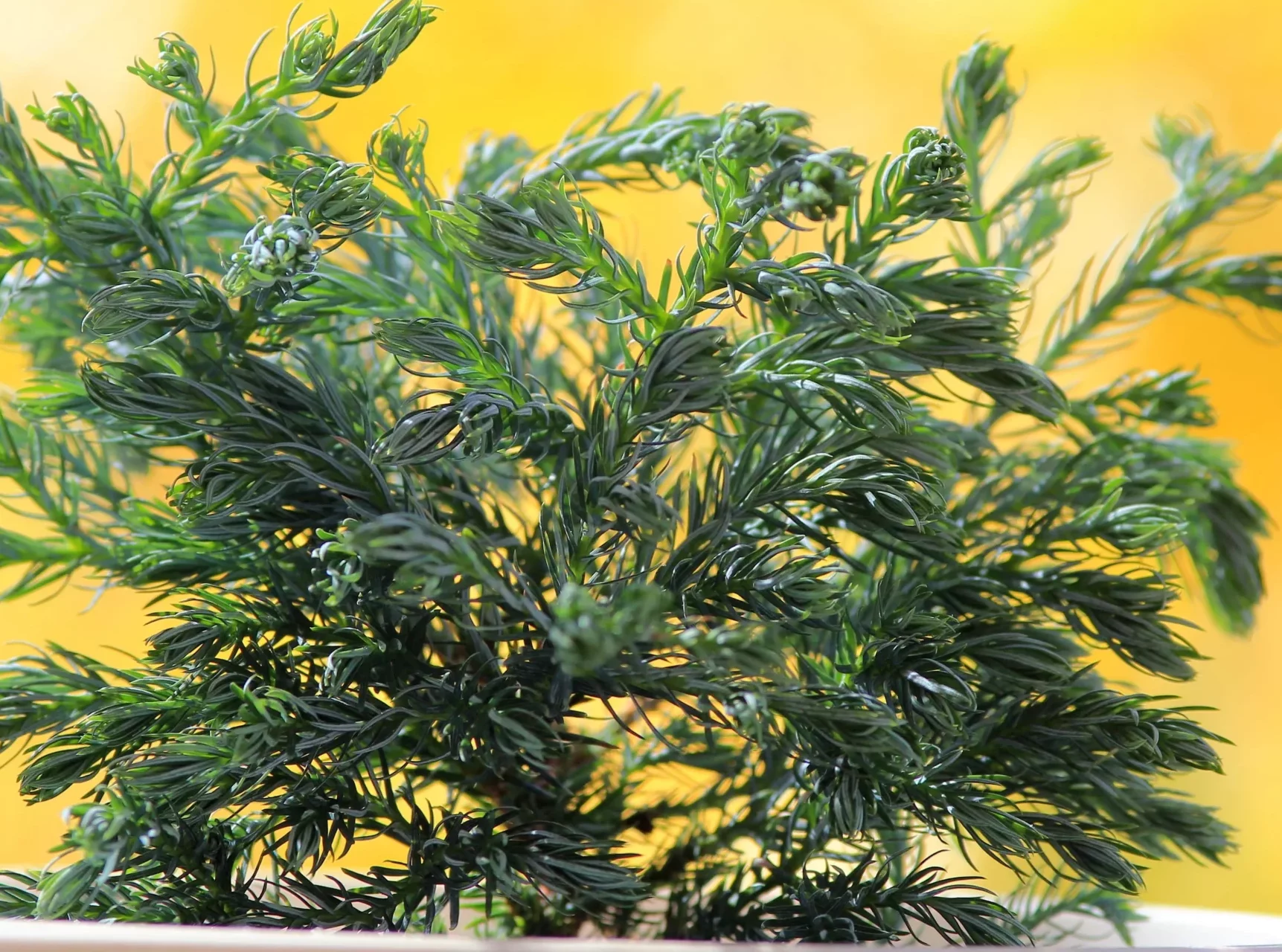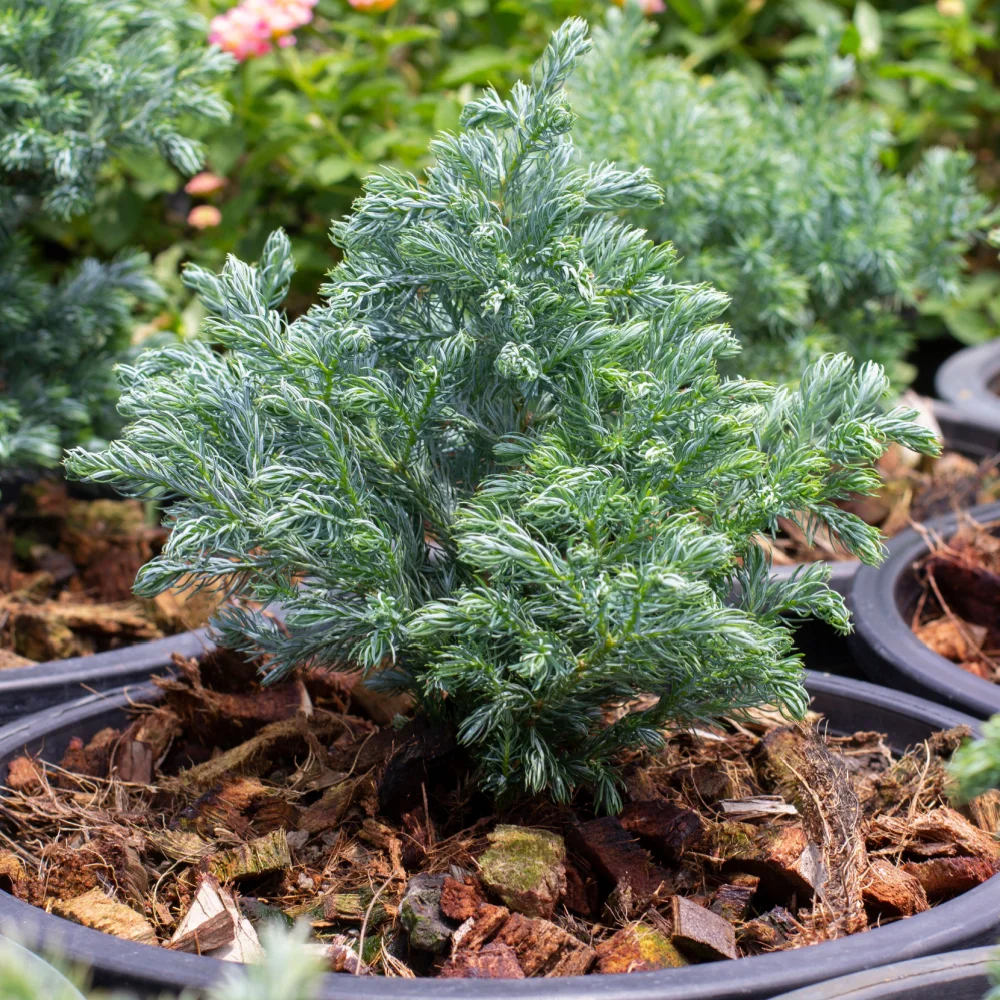Family: Cypress
Type: Shrub
Other Common Name: Japanese False cypress, Sawara False cypress

The Baby Blue Sawara Cypress is a vibrant, evergreen gem. Its striking blue foliage makes it a standout in any garden setting.
This dwarf conifer is ideal for small spaces. It grows slowly, requiring minimal maintenance and pruning.
Its compact size and unique color offer year-round interest. This makes it a favorite among garden enthusiasts and landscape designers.
Hardiness Zone: 4b-6a
Pet Friendly: Yes
Moisture Preference: Average to moist
Sun Needs: Full sun to partial shade
Growth Rate: Slow
Average Height (feet): 10
Average Spread (feet): 8
Average Life Span (years): 60
Form: Upright spreading
Foliage Color: Blue
Leaf Fall Color: Orange
Foliage Shape: Threadlike
Incorporating Baby Blue Sawara Cypress into your landscape is simple. It thrives in a variety of soil types and sun exposures.
Use it as a focal point or a complement to other plants. Its blue foliage contrasts beautifully with green and flowering plants.
This plant is perfect for creating structured, yet natural-looking borders. It’s also great for adding vertical interest in mixed beds.

A Formal Garden is an ideal setting for Baby Blue Sawara Cypress. Its symmetrical growth and striking color enhance the orderly beauty of formal landscapes. Pair it with neatly trimmed hedges and geometric garden layouts for a classic look.
In Rock Gardens, the Baby Blue Sawara Cypress adds a splash of color. Its unique blue hue contrasts with the natural tones of stones and gravel. This plant thrives among rockeries, bringing life and color to these rugged landscapes.
In a Cottage Garden setting, Baby Blue Sawara Cypress brings structure and year-round interest. Its compact form fits well amidst a mix of flowering perennials and shrubs. It adds a touch of elegance to the charming disarray of cottage-style gardens.
Create a serene corner with Baby Blue Sawara Cypress. Surround it with white pebbles and a few ferns for a minimalist, Zen-inspired look.
Design a colorful border using this cypress. Alternate it with flowering shrubs like hydrangeas for a vibrant display.
Use it in container gardens on patios or balconies. Its slow growth and compact size make it ideal for pots and planters.
Select our pre-made garden layouts to create a landscape that’s uniquely yours. Simple, smart, and customizable!
In spring, the Baby Blue Sawara Cypress's blue needles shimmer in the growing light. New growth emerges, adding a fresh look to the garden. Its vibrant color is a welcome sight after the dull winter months.
During summer, the cypress maintains its striking blue color. It becomes a steadfast element in the garden, withstanding the heat. Its robust foliage provides a cool visual relief on hot days.
In fall, while other plants start to fade, the Baby Blue Sawara Cypress continues to shine. Its blue foliage stands out among the autumn colors. It adds depth and contrast to the garden as the season changes.
Winter highlights the enduring beauty of the Baby Blue Sawara Cypress. Its blue needles contrast sharply with the white snow. The plant remains a focal point in the garden, providing color and structure during the colder months.
Choose a location with adequate space for the Baby Blue Sawara Cypress to grow. It should be away from structures as this plant can spread over time. Ideal spots are open areas in the garden or alongside fences.
Baby Blue Sawara Cypress thrives in full sun to partial shade. An area that receives at least 4-6 hours of direct sunlight is optimal. This ensures vibrant foliage and healthy growth.
This cypress prefers well-drained soil. It's adaptable to a range of soil types, including sandy, loamy, or clay. Avoid waterlogged areas to prevent root rot.
Space plants about 3-5 feet apart. This allows room for growth while creating a dense, visually appealing landscape. Consider mature size for optimal spacing.
Plant in early spring or fall. Cooler temperatures allow roots to establish before extreme weather. Ensure the ground is not frozen or overly wet.
Dig a hole twice as wide as the root ball but the same depth. Place the plant in the hole, fill with soil, and water thoroughly. Mulching around the base can help retain moisture.
Water regularly, especially during dry spells. Established plants are somewhat drought tolerant but benefit from consistent moisture.
Apply a balanced, slow-release fertilizer in early spring. This supports growth without overwhelming the plant.
Prune in late winter or early spring. Remove dead or damaged branches to maintain shape and health.
In spring, increase watering as new growth appears. Apply mulch to conserve moisture and control weeds.
Monitor soil moisture in summer. Water deeply during prolonged dry periods. Check for pests and treat as necessary.
Prepare for winter by reducing watering. Apply a light layer of mulch to protect roots from freezing temperatures.
In winter, ensure the plant is not exposed to harsh winds. Water sparingly, as the plant requires less moisture during dormancy.
Baby Blue Sawara Cypress grows slowly, typically a few inches per year. This makes it ideal for small gardens and reduces the need for frequent pruning.
Yes, Baby Blue Sawara Cypress can be grown in pots. Choose a large container with drainage holes and repot every few years to accommodate growth.
This plant is somewhat deer resistant. While no plant is completely deer-proof, Baby Blue Sawara Cypress is not a preferred choice for deer, making it suitable for gardens in deer-prone areas.
Sign up below to get exclusive deals, discounts, and new plant collections—delivered straight to your inbox! Plus, stay inspired with the latest gardening tips, landscaping trends, and DIY garden ideas. Start growing with us today!
A big thank you for subscribing to the PBN Design newsletter.
We're thrilled to have you join our community. Get ready for exciting updates, insightful content, and more delivered straight to your inbox.
Stay tuned!
Go backA big thank you for subscribing to the PBN Design newsletter.
We're thrilled to have you join our community. Get ready for exciting updates, insightful content, and more delivered straight to your inbox.
Stay tuned!
Go back